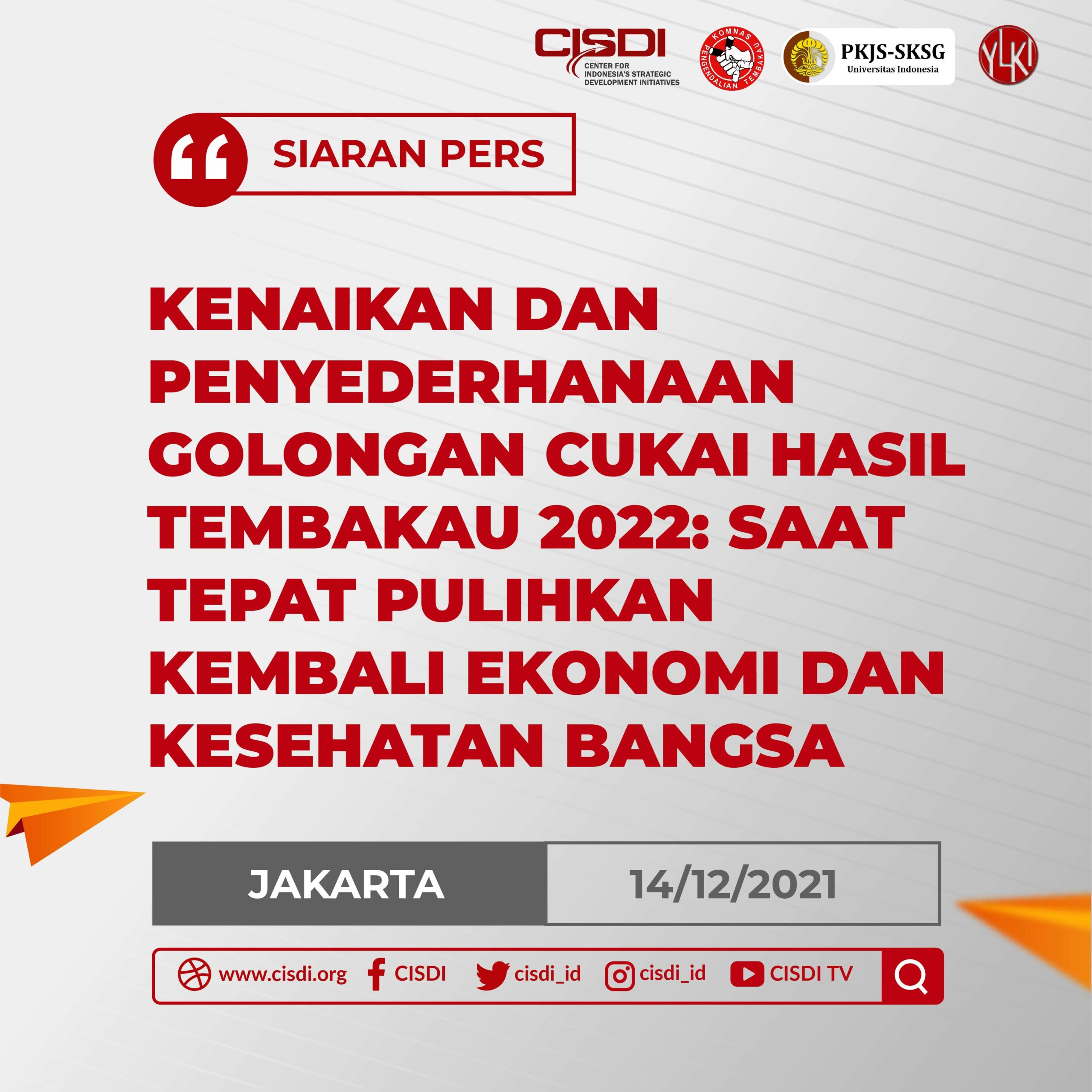
Press Release
Indonesia in 2022, Rising the Cigarette Excise Tax and Simplifying the System
CISDI Secretariat • 13 Des 2021
Jakarta, December 14 2021 – The cigarette excise rates increased by an average of 12% was just announced by the Ministry of Finance on 13 December 2021. This increase is clearly lower compared to the past two years which reached 12.5% (2021) and 23.5% (2020). However, simplifying the excise tax rate groups from 10 to 8 groups should be appreciated as it potentially enables a reduction in the variety of cheap cigarettes and the prevalence of smokers themselves.
Cigarettes hamper human development as well as burden the economy and health. Children from families with active smokers are 5.5% more prone to stunting than children from families who don't smoke (CSSUI, 2018). On the other hand, the tendency for cigarette consumption to increase during a pandemic (NCTC, 2020) adds to the economic and health burden of IDR 17.9 - 27.7 T for a year due to diseases caused by smoking ( CISDI, 2021). Thus, it is important to control cigarette consumption, one of them is through excise tax that has proven effective in reducing the prevalence of smokers in various countries in the world.
Simplifying the excise tax system is also necessarily done to not give the industry the opportunity to switch to low-tariff groups. In addition, an increase in the minimum retail selling price can also make cigarettes expensive in the market. Imposing excise duty on other tobacco products is also needed because the consumption by young people has also greatly increased. The state must no longer see cigarette excise as a source of state revenue but a policy to protect public health. The revenue, including the Tobacco Excise Revenue Sharing Fund, is to overcome the resulting problems. It can also be used to improve the welfare of tobacco farmers.
Prof. Hasbullah Thabrany as General Chair of the National Committee on Tobacco Control said, "I appreciate the government's steps towards increasing excise duty and simplifying excise tax categories for 2022, because the government should no longer be afraid of the myths of economic losses caused by the tobacco industry which hinder the increase in cigarette excise. Tobacco control measuring standards are very clear: the degree of health and welfare of the people has increased, no illnesses caused by smoking. So raising the cigarette prices should be done, no need to look for justification for delaying the increase in cigarette excise every year! Don't forget we are investing for the future!”
Prof. Hasbullah's argument is in line with the results of a study from CISDI, Yurdhina Meilissa as CISDI's Chief Strategist conveyed the study regarding the macroeconomic impact of the increase in cigarette excise, "Based on the results of input-output analysis, the increase in cigarette excise does not necessarily have a negative impact on the economy, as has been often worried. Even an increase in excise rates of up to 45% is expected to continue to have a positive impact on the economy with positive output values and job creation. Thus, an average increase of 12% which will take effect next year, is not going to have a significant impact on economic conditions.” (Full details about the results of the study can be read at the link https://bit.ly/reportmacroecontax)
Aryana Satrya, Chairperson of CSSUI, explained the results of his research. "The increase in cigarette excise and the simplification of the excise system followed by an increase in the suggested market price can motivate smokers to stop smoking so that household finances to fulfill family nutrition are no longer corrupted by spending on cigarettes. Families are healthier and the stunting rate can be kept down."
He added that the impact of cigarette consumption is multi-dimensional. Moreover, smoking also has a negative impact on the family economy, including stunting and poverty. The results of the 2020 CSSUI study show that apart from the peer factor, a child is encouraged to smoke because it is cheap. "We see that the increase in cigarette excise tax supports the achievement of the Government of the Republic of the 2024 National Medium-Term Development Plan (RPJMN) target to reduce the prevalence of child smokers to 8.7%, and to reduce the prevalence of stunting in toddlers to 19%."
The press conference was closed with a statement by Tulus Abadi, Chief Executive of Indonesian Consumers Protection Foundation (YLKI), stating that a 12% increase in cigarette excise duty was a necessity for regulation, which should be appreciated, especially when accompanied by a simplification of the cigarette excise system. Tulus added, in parallel, to be truly effective for controlling consumption, cigarette control with the excise instrument must be accompanied by efforts to control cigarette marketing. "Therefore, we urge the government to ban the sale of cigarettes in packets, or per stick (single stick sales), because selling cigarettes in packets is the easiest way for children and youth to buy cigarettes."
.png)